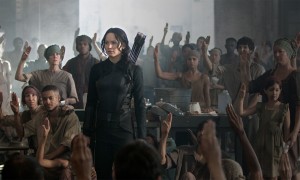Hunger Games isn’t the first film to pit human against human for sport
 By Richard Crouse – Metro Canada
By Richard Crouse – Metro Canada
Since the release of the first Hunger Games novel in 2008, literary sleuths have picked it apart, searching for connections to other books and films.
The scrutiny increased when the first film in the tetralogy set records for the biggest opening weekend for a non-sequel in 2012, and continues unabated with the release of this weekend’s The Hunger Games: Mockingjay, Part 1.
Based on Suzanne Collins’s mega-successful series, the movies are set in a dystopian world ruled by a fascist-style president (Donald Sutherland) who presides over The Hunger Games, a televised battle-to-the-death between 24 young players, two from each of the country’s districts, including Katniss Everdeen (Jennifer Lawrence) and Peeta Mellark (Josh Hutcherson).
The series draws on things we’ve seen before, in everything from the human sacrifices of Greek mythology or Survivor-style television shows to news stories of government corruption to create a world with its own rules, style and customs.
The most often-cited influence is Battle Royale, a 2000 Japanese movie based on a book by Koushun Takami. Like The Hunger Games, it’s a story of school kids in a televised government-sanctioned death match.
Battle Royale’s DVD box set even included a quote from a critic suggesting there’d be no Hunger Games without the Japanese film. “This is the movie that started it all,” it reads.
Hunger fans were quick to point out differences in the two films. The Japanese movie is about survival, they said, while Collins wrote about revolution. The author revealed her main influences were reality television and the Iraq war.
“I had never heard of that book or that author until my book was turned in,” she told the New York Times.
It’s worth noting that the idea of humans being preyed upon for the entertainment of the upper classes dates back at least as far as 1932’s The Most Dangerous Game. The story of a big-game hunter who tracks humans for sport on an isolated island is based on a Richard Connell short story that also loosely inspired episodes of everything from Gilligan’s Island to Lost in Space. Since then, Norman Jewison’s Rollerball, Roger Corman’s Deathrace 2000 (and its 2008 Jason Statham remake) and The Running Man have mined similar territory.
As for the author who wrote Battle Royale, he gave ABC News a very diplomatic answer when asked about the similarities between the two stories. “I think every novel has something to offer,” he said. “If readers find value in either book, that’s all an author can ask for.”
